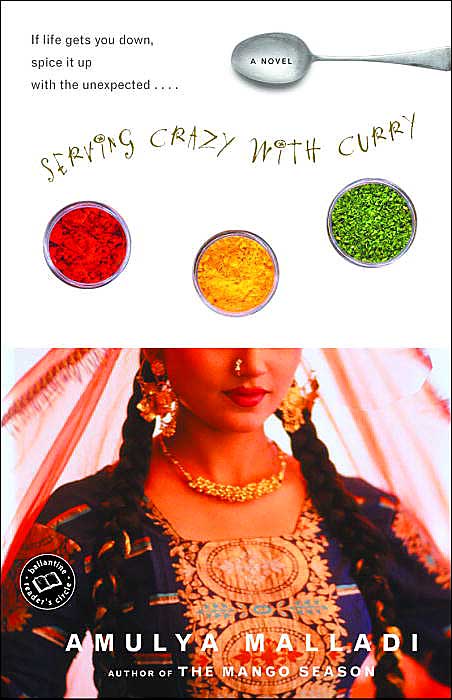Serving Crazy with Curry
Amulya Malladi
fiction
Reviewed by: Carrie Byrd
Review posted: 03/14/05
 There are times when I am in conflict with myself. I exist both as a reader and as an individual with morals and beliefs that sometimes do not align with the morals expressed in a book. And even though the book may be enjoyable and well written, that inner voice is saying that maybe I shouldnít enjoy it because it is so at odds with my beliefs.
There are times when I am in conflict with myself. I exist both as a reader and as an individual with morals and beliefs that sometimes do not align with the morals expressed in a book. And even though the book may be enjoyable and well written, that inner voice is saying that maybe I shouldnít enjoy it because it is so at odds with my beliefs.
Obviously, any story that can create such conflict is worth reading because it challenges you to reassess your own perspective on the issues it raises. Whether or not it changes them is a different issue.
So the good news is that Serving Crazy with Curry is thought provoking, well written and interesting. The bad news is, I canít decide if I like any of the characters or not. Well, to be fair, her mother, father, and sister didnít really bother me. They, among all the characters seem to have the most realistic issues and personal struggles that they contained within themselves. The other characters, including the protagonist, Devi, expressed themselves in ways that were damaging to others and seemingly without thought for their actions would affect others.
The novel opens with Devi planning her suicide. Right there is the key to why I am ambivalent. Rather than thinking of her family, her friends, how her actions will affect them, we see her thinking only of how sad her own life it. This is the start of a trend. Itís not a good trend.
In addition to the conflict of personalities there is also a conflict between tradition, personal beliefs and the pursuit of happiness. Malladi has tackled the question of whether or not happiness is really a God-given right or if it is merely something we have decided we are entitled to and deserve no matter how it affects others. Malladi seems to believe that the truth falls somewhere in between.
Malladi does show a tendency to lean towards the expected and predictable, and the novel doesnít try to break into new ground. The use of cooking in womenís writing has become a common device. The expression of Deviís frustration with trying to fuse her future with her familyís past is expressed through her cooking as she fuses old recipes with new flavors and techniques. The conflict in this case is both cultural and generational. Deviís grandmother faced the future and challenged expectations but it caused a response from Deviís mother Saroj, who reverts to more traditional values. When Saroj has two daughters of her own the conflicts become even clearer.
In the last paragraph you can probably site half a dozen familiar plot devices that have appeared in recent womenís literature. That is the greatest weakness in Malladiís writing. The familiarity of the elements introduced here takes away some of the bite that it might otherwise have had. Malladi does tackle some difficult issues, but they fade seamlessly into stories weíve heard and read many times. This was well done and interesting, but Malladi needs to take care that her own ideas donít get lost in the predictable and comfortable stories that we have come to expect.
|




 There are times when I am in conflict with myself. I exist both as a reader and as an individual with morals and beliefs that sometimes do not align with the morals expressed in a book. And even though the book may be enjoyable and well written, that inner voice is saying that maybe I shouldnít enjoy it because it is so at odds with my beliefs.
There are times when I am in conflict with myself. I exist both as a reader and as an individual with morals and beliefs that sometimes do not align with the morals expressed in a book. And even though the book may be enjoyable and well written, that inner voice is saying that maybe I shouldnít enjoy it because it is so at odds with my beliefs.